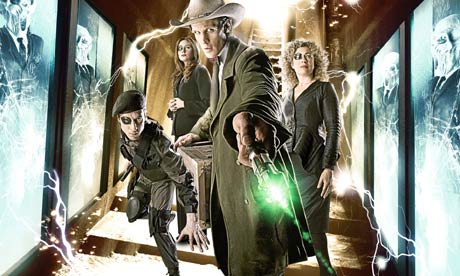During BBC2's Newsnight interview he responded to the debate over the quality of
this year’s shortlist by saying “Jane Austen – what is she if not readable?”
The Booker isn’t just Bingo, of course, it is a cultural
frontline. It is one of the few nationally recognised prizes the truly eggheaded
claim to be their own and - like The Proms and Book at Bedtime - they are damn well not about to give it up.
Winterson's argument is heartfelt, if a little bizarre. She has the grump that the Booker chairman this year, Stella Rimginton, is a former head of Britain's spies. She was an odd choice -- Rimington's books are hardly literary. And there were comments by the judges: Susan Hill saying she didn't mind experimentation if it came from genius, Chris Mullin saying books should 'zip along'. For the true literati, these were ominous utterings that bordered on Richard&Judyism.
As if books were meant to be enjoyed! Tsk. You must read a book that makes your head hurt and your stomach churn, otherwise you are just wasting your time and might as well be listening to MoneyBox on Radio Four.
And then of course, so many early favourites didn't make the shortlist. Alan Hollinghurst and Smith were the most notable. Talk of a new Literary Award to rival the Booker grew out of this rebellion -- but don't hold your breath. There is more to mounting a lit award than a few agents and publishers moaning about quality. There's money for one thing.
But ultimately, what use is the Booker?
Below is a list of past winners. I'm struck by how few I've read (reflecting perhaps my chippy northerner habit of not reading what I'm told but reading something else I just fancy the look of). I wonder though how many of them will be considered worthy of consideration ten or fifteen years from now.
One issue I've long had with the Booker, which hasn't been mentioned this year, is the fact it is limited to British and Commonwealth writers. Canadians feature but not Americans. Indians but not French. It is the last bastion of Empire.
For any award that claims to be about what is best in literature this strikes me as a surprising flaw. I can understand limiting it to English language novels... but many of the best writers in the last 20 years have been from the US.
Man Booker prize, complete list of winners
1969 – Something to Answer For, P.H. Newby
1970 – The Elected Member, Bernice Rubens
1971 – In a Free State, V. S. Naipaul
1972 – G, John Berger
1973 – The Siege of Krishnapur, J.G. Farrell
1974 – The Conservationist, Nadine Gordimer
Holiday, Stanley Middleton (shared)
1975 – Heat and Dust, Ruth Prawer Jhabvala
1976 – Savile, David Storey
1977 – Staying On, Paul Scott
1978 – The Sea, the Sea, Iris Murdoch
1979 – Offshore, Penelope Fitzgerald
1980 – Rites of Passage, William Golding
1981 – Midnight’s Children, Salman Rushdie
1982 – Schindler’s Ark, Thomas Keneally
1983 – Life & Times of Michael K, J. M. Coetzee
1984 – Hotel du Lac – Anita Brookner
1985 – The Bone People – Keri Hulme
1986 – The Old Devils, Kingsley Amis
1987 – Moon Tiger, Penelope Lively
1988 – Oscar and Lucinda, Peter Carey
1989 – The Remains of the Day, Kazuo Ishiguro
1990 – Possession: A Romance, A. S. Byatt
1991 – The Famished Road, Ben Okri
1992 – The English Patient, Michael Ondaatje
Sacred Hunger, Barry Unsworth (shared)
1993 – Paddy Clarke Ha Ha Ha, Roddy Doyle
1994 – How late it was, how late, James Kelman
1995 – The Ghost Road, Pat Barker
1996 – Last Orders, Graham Swift
1997 – The God of Small Things, Arundhati Roy
1998 – Amsterdam, Ian McEwan
1999 – Disgrace, J. M. Coetzee
2000 – The Blind Assassin, Margaret Atwood
2001 – True History of the Kelly Gang, Peter Carey
2002 – Life of Pi, Yann Martel
2003 – Vernon God Little, DBC Pierre
2004 – The Line of Beauty, Alan Hollinghurst
2005 – The Sea, John Banville
2006 – The Inheritance of Loss, Kiran Desai
2007 – The Gathering, Anne Enright
2008 – The White Tiger, Aravind Adiga
2009 – Wolf Hall, Hilary Mantel
2010 – The Finkler Question, Howard Jacobson
2011 – The Sense of an Ending, Julian Barnes
BOOKER FACTS:
“Lost Man Booker Prize” – 1970 – Troubles, J. G. Farrell
(awarded in 2010 by public
vote to a 1970 novel, as a rules alteration that year meant
books published that year were not eligible for the 1970 award)
“Booker of Bookers” awarded in 1993 to 1981 winner
(Midnight’s Children, Salman
Rushdie), title of best winner in award’s first 25 years
“The Best of the Booker” awarded by public vote in 2008 to
the same book, to
celebrate the award’s 40th anniversary
Peter Carey and J. G. Coetzee are the only authors to have
won twice
Three winners have gone onto win the Nobel prize for literature
– Nadine Gordimer in
1991, V. S. Naipaul in 2001, J. M. Coetzee in 2003
Several winning books have been made into film adaptations:
Schindler’s Ark
(Stephen Spielberg’s Schindler’s List), The Remains of the
Day and The English
Patient.
Schindler’s List and The English Patient both went
onto win an Academy
Award for Best Picture
Man Booker International prize established in 2005, awarded
bi-annually to a writer
2005 – Ismail Kadare
2007 – Chinua Achebe
2009 – Alice Munro
2011 – Philip Roth


